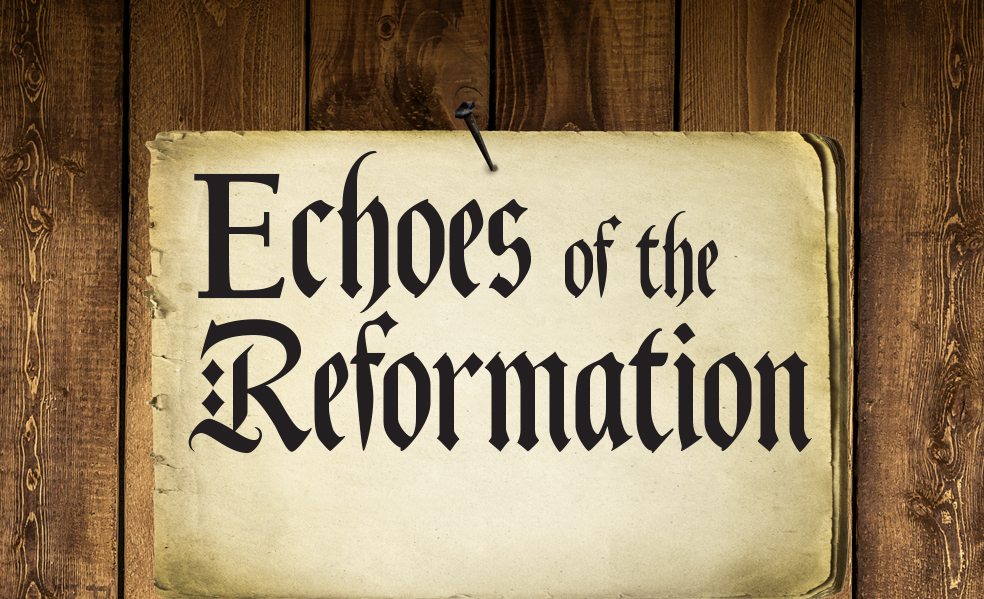
Centuries later, the five solas still echo. They still have weight and meaning. They’re still core to who we are and what we confess.
By Brandon D. Smith
In our rapidly changing culture, something that happened five minutes ago can often be forgotten. But this year, we celebrate an event from 500 years ago that still reverberates.
In 1517, a German theology professor named Martin Luther challenged the Roman Catholic Church by publishing his 95 Theses and, as legend has it, nailing them to the door of the Castle Church in Wittenberg.
Luther’s theses were a clarion call for the Catholic Church to reform. In short, Luther saw the church drifting away from core biblical truths about the authority of Scripture and the grace found in Christ alone through faith alone.
The church’s view of salvation had become centered on man’s efforts rather than on God’s grace.
Following Luther’s action, five beliefs emerged as the foundation of the Reformation. The five solas, as they are known today, were birthed out of the German reformer’s convictions and infused into the movement that followed his lead.
Centuries later, those beliefs still echo. They still have weight and meaning today. They’re still core to who we are and what we confess as Christians.
Sola Scriptura – Scripture Alone
All Scripture is inspired by God and is profitable for teaching, for rebuking, for correcting, for training in righteousness, so that the man of God may be complete, equipped for every good work. 2 Timothy 3:16-17
The church in Luther’s day didn’t grasp this Scripture. The church taught the Pope could access God in a way equal to the Bible. The Pope had as much power as Scripture.
But Paul tells Timothy that Scripture is from God and makes Christians “complete.” It’s not Scripture plus anything else. Scripture alone is all we need to learn about God and teach others about God.
In our modern world—where authority is often defined by one’s personal beliefs—Christians need to be reminded Scripture alone is our authority.
It’s easy to look to someone or something else to find truth or wisdom, but Scripture is God-breathed. It is literally God’s words breathed out into ink. Scripture is the ultimate deposit of truth and wisdom.
Sola Gratia – Grace Alone
For sin will not rule over you, because you are not under law but under grace. Romans 6:14
Grace is most easily defined as “unmerited favor.” God gives grace because He’s loving and merciful, not because we deserve it. It’s free. Absolutely, positively free. Just as in Luther’s day, we need to make sure people understand grace can’t be bought or earned.
We are saved by grace alone. God in His Word tells us we have no shot of earning it. And that’s OK, because Jesus is walking, talking grace—grace with 10 fingers and 10 toes.
The fact that His feet touched the earth’s soil shows us we couldn’t do it alone. God Incarnate had to come here to live the life we couldn’t live and die the death we should’ve died.
Instead of looking for grace anywhere else, Christians must be constantly reminded the gift of grace is found in the perfect Gift-Giver (James 1:17).
Sola Fide – Faith Alone
For you are saved by grace through faith, and this is not from yourselves; it is God’s gift—not from works, so that no one can boast. Ephesians 2:8-9
In this verse, we see grace and faith together. The fact that we even have faith is a gift of grace! We are justified—declared right with God—through faith alone. This sola is perhaps the cornerstone of the Reformation.
Luther’s struggle with his own sin, his continued feeling of absolute wretchedness, reminded him that faith was all he had. He couldn’t offer anything else.
Knees on the ground and palms in the air, he had faith that God saved him. That was his only hope, and it was the only hope he needed.
Though we’re always tempted to try to justify ourselves, we can never forget we are justified based on Christ’s righteousness and nothing else. It’s not about what we do but about what He’s done.
Solus Christus – Christ Alone
Jesus told him, “I am the way, the truth, and the life. No one comes to the Father except through me.” John 14:6
In Timothy George’s Theology of the Reformers, he quotes Luther reminding the wayward leaders of his day: “You are not lords over the pastoral office.… You have not instituted the office, but God’s Son alone has done so.”
When it comes to salvation: Christ alone. And, despite their importance according to Hebrews 13:17, even when it comes to church leaders: Christ alone.
There is no Christianity without Christ. Sometimes, when we’re caught up in ourselves or even our churches and ministries, we forget we don’t own Christianity.
We’re on Christ’s mission; He’s not on ours. There is no grace without Christ. There is no faith without Christ. Frankly, there is no Scripture without Christ, for Scripture is about Him (John 5:39).
No man is perfect, but one Man was. Let us continue to remind others and ourselves that grace alone through faith alone in Christ alone is our only hope for salvation.
Soli Deo Gloria – Glory to God Alone
The heavens declare the glory of God, and the sky proclaims the work of His hands. Psalm 19:1
I noted earlier that sola fide might be the cornerstone of the Reformation. If that’s the case, soli Deo gloria might be the mortar that holds the stones together.
In short, God’s glory is the total sum of who He is and what He does. He takes second place to no one.
God’s glory is the proclamation that He is sovereign over all things. We see it clearly in creation (He is sovereign, all-powerful, and beautiful) and in salvation (He is loving, just, and merciful).
Because of our sin, we are glory hogs. We want—crave—glory. Christians should always remember, however, that God’s glory is the aim of our worship.
If we could save ourselves, we could share glory with God. But as we know, we can’t save ourselves. Glory to God, however, He has saved us!
Doctrine is not an academic add-on to the Christian life. What we believe is a filter for everything we do. According to Paul in Romans 10:9, what we confess with our mouths and believe in our hearts is a matter of our salvation, of our eternity.
Luther and the Reformers fought for everyday Christians, not just scholars or seminarians.
As David VanDrunen points out in his book God’s Glory Alone: The Majestic Heart of Christian Faith and Life, the church in Luther’s day didn’t deny the importance of Scripture, grace, faith, and Christ in salvation. But if you had asked about “the little word alone, we would soon find genuine disagreement.”
Once we understand that alone really means alone, we can stand before God with nothing to offer but humble worship for who He is and what He has done. The Reformation still echoes today, if we are willing to listen.
BRANDON D. SMITH (@BrandonSmith85) works with the Christian Standard Bible and teaches theology at California Baptist University. He’s also co-author of Rooted: Theology for Growing Christians and co-hosts the Word Matters podcast.











